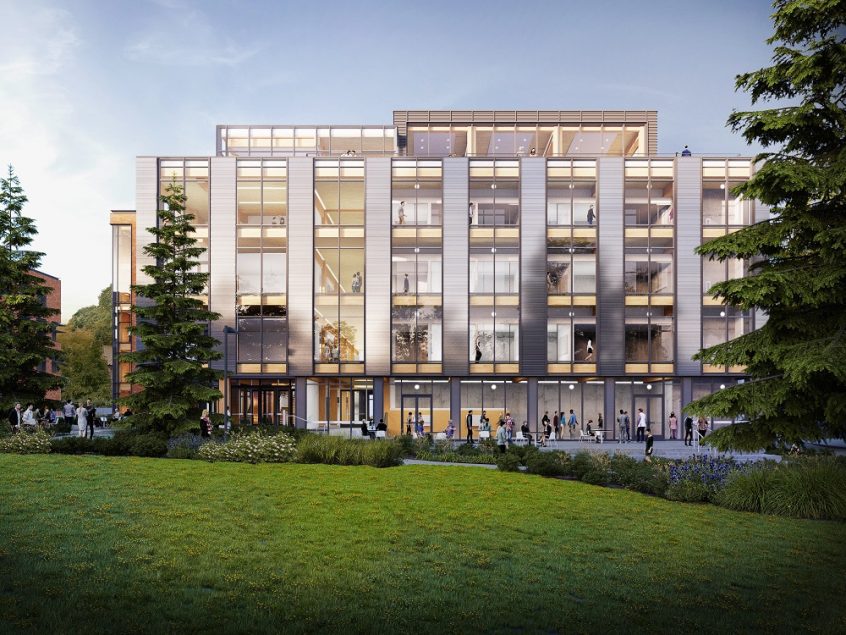The newest building at the University of Washington (UW) could represent a significant step forward in sustainability and reducing greenhouse gas emissions for the Seattle campus. Acclaimed in a Puget Sound Business Journal article as “one of the greenest buildings on campus” and lauded in a UW blog as a “genuine showpiece on the University of Washington campus,” Founders Hall will expand the Foster School of Business education complex.
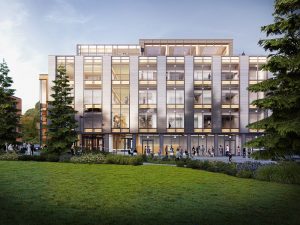
Founders Hall from Denny Yard. (All photos courtesy of the University of Washington Foster School of Business.)
The five-story, 85,000-square-foot building is made from mass timber and is designed to “achieve 79% reduction in energy consumption over the first 60 years of its life.” The state-of-the-art building demonstrates how UW could apply the use of sustainable construction materials and green approaches in future campus building projects to reach its ambitious goal of a 45% reduction in greenhouse gas emissions by 2030.
“To have a mass timber building be the final piece of the Foster School campus redevelopment is a big deal,” said Dan Fulton, retired Weyerhaeuser CEO and Foster School MBA graduate who now sits on the Foster School advisory board. “This is exciting to see the business school embrace the latest construction technology and demonstrate its innovation as it builds up programming in carbon accounting and finance.”
As seen in the video walk through, cross-laminated timber plays a prominent role in Founders Hall. Once complete, the building will house classrooms, experiential learning centers, student team rooms, space for student programs and career services for Foster School of Business students.
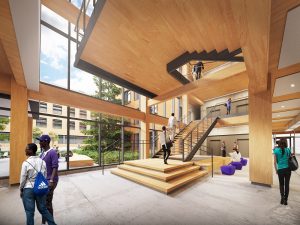
Central stairway.
“The purpose of the Foster School is to bring communities together to better humanity through business,” said Frank Hodge, Orin and Janet Smith Dean, UW Foster School of Business. “Founders Hall, with its connections to the forest products industry in the Pacific Northwest, its Native art, and its significantly reduced carbon footprint, is an example of how we are living our purpose as a forward-thinking business school.”
Incorporating both traditional wood and mass timber in public and private developments offer numerous environmental benefits. Wood is a renewable resource that can be locally sourced in Washington state and throughout the United States.
In addition, trees absorb greenhouse gases from the atmosphere and sequester the carbon in the trunk, branches, leaves and roots. Once harvested, that carbon remains stored throughout the wood product’s lifespan – making sustainably sourced wood a far more environmentally friendly building material than steel or concrete.
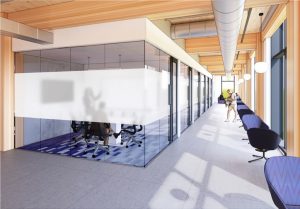
Team rooms.
Naturally, wood construction clearly offers environmental benefits. But designing and building with traditional and engineered wood provides other advantages as well. Wood offers good thermal and sound insulation, which can be especially beneficial for regions that experience excessive cold or hot temperatures.
Mass timber construction is cost-effective as it relates to building materials and labor. Because it is prefabricated, engineered wood makes for efficient assembly at the building site that results in lower costs, less waste and faster installation. Cross-laminated timber is fire resistant, strong and performs well during seismic activity because of the way it is made.
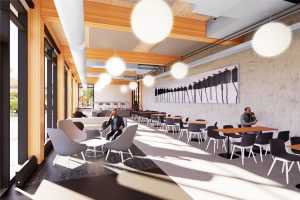
Founders Hall commons.
Finally, natural materials promote human health and a sense of wellbeing. There is a growing body of research that affirms incorporating biophilic design can elevate comfort, decrease stress, lower blood pressure and facilitate a more welcoming environment for students and workers.
Founders Hall is scheduled for completion this summer. LMN Architects designed Founders Hall and Hoffman Construction Company is the general contractor.
